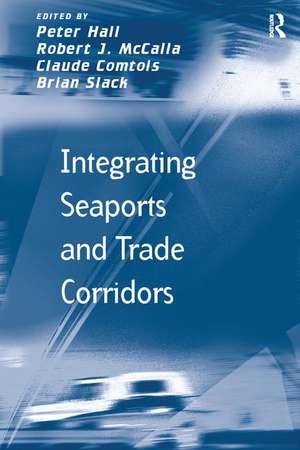Integrating Seaports and Trade Corridors
Autor Robert J. McCalla Editat de Peter Hall Autor Brian Slacken Limba Engleză Paperback – 3 oct 2016
| Toate formatele și edițiile | Preț | Express |
|---|---|---|
| Paperback (1) | 469.34 lei 6-8 săpt. | |
| Taylor & Francis – 3 oct 2016 | 469.34 lei 6-8 săpt. | |
| Hardback (1) | 1063.41 lei 6-8 săpt. | |
| Taylor & Francis – 28 dec 2010 | 1063.41 lei 6-8 săpt. |
Preț: 469.34 lei
Nou
Puncte Express: 704
Preț estimativ în valută:
89.82€ • 93.65$ • 74.65£
89.82€ • 93.65$ • 74.65£
Carte tipărită la comandă
Livrare economică 20 martie-03 aprilie
Preluare comenzi: 021 569.72.76
Specificații
ISBN-13: 9781138249370
ISBN-10: 1138249378
Pagini: 310
Dimensiuni: 156 x 234 x 24 mm
Greutate: 0.45 kg
Ediția:1
Editura: Taylor & Francis
Colecția Routledge
Locul publicării:Oxford, United Kingdom
ISBN-10: 1138249378
Pagini: 310
Dimensiuni: 156 x 234 x 24 mm
Greutate: 0.45 kg
Ediția:1
Editura: Taylor & Francis
Colecția Routledge
Locul publicării:Oxford, United Kingdom
Notă biografică
Peter Hall, Associate Professor of Urban Studies, Simon Fraser University, Vancouver, British Columbia, Canada, Robert J. McCalla, Professor of Geography, Saint Mary's University, Halifax, Nova Scotia, Canada, Claude Comtois, Distinguished Professor Emeritus, Université de Montréal, Canada and Brian Slack, Department of Geography, Concordia University, Montréal, Québec, Canada.
Recenzii
'This book builds on the strengths of previous Ashgate books from the same research network: a diverse and international mix of authors, an interesting and relevant theme and theoretical as well as applied contributions. An interesting read for scholars and students interested in ports as elements of global supply chains.' Peter de Langen, Eindhoven University of Technology, The Netherlands and Port of Rotterdam Authority, The Netherlands 'This book is a most interesting read, albeit heavily focused on geography, as well as predominantly on the Canadian transport situation, the latter heavily orientated toward policy and governance issues. It brings together a number of new and developing themes and perspectives, all of which are of great value to those interested in maritime transport, seaports, integration, intermodality, logistics and of course trade corridors.' Journal of Transport Geography 'Overall, the book brings together the knowledge and the experience of many well-known scholars from worldwide recognised universities who for many years have conducted research on the proposed themes, and as such the book offers a holistic view about the benefits gained and the problems arising when integrating seaports into trade corridors. The book is a major contribution to academia and the industry since it clarifies concepts such as transhipment hubs, extended gateways, which are used on a daily basis and whose meanings are taken for granted. Furthermore, as readers go from one chapter to another, they get a holistic view of the topic under study thus providing a clear understanding how the different elements interact'. The Asian Journal of Shipping and Logistics
Cuprins
1: Introduction; I: Global Economic Change: Implications for Ports, Corridors and Value Chains; 2: Economic Cycles in Maritime Shipping and Ports: The Path to the Crisis of 2008; 3: Organizational and Geographical Ramifications of the 2008–2009 Financial Crisis on the Maritime Shipping and Port Industries; 4: Carriers' Role in Opening Gateways: Experiences from Major Port Regions; 5: Transport and Logistics Hubs: Separating Fact from Fiction; 6: Port, Corridor, Gateway and Chain: Exploring the Geography of Advanced Maritime Producer Services; II: Measuring and Improving Gateway and Corridor Performance; 7: Measuring Port Performance: Lessons from the Waterfront; 8: Key Interactions and Value Drivers towards Port Users' Satisfaction; 9: Improving Port Performance: From Serving Ships to Adding Value in Supply Chains; 10: Coordination in Multi-Actor Logistics Operations: Challenges at the Port Interface; III: International Case Studies; 11: Benchmarking the Integration of Corridors in International Value Networks: The Study of African Cases; 12: Building Value into Transport Chains: The Challenges of Multi-Goal Policies; 13: Perspectives on Integrated Container Transport: The Canadian Example; 14: Trade Corridors and Gateways: An Evolving National Transportation Plan; 15: Hinterlands, Port Regionalisation and Extended Gateways: The Case of Belgium and Northern France; 16: Entrepreneurial Region and Gateway-Making in China: A Case Study of Guangxi
Descriere
How can the benefits of maritime trade be increased for the companies and institutions directly involved as well as the port city-regions where the transfers take place? Tackling this question, the authors of this volume put into perspective the reality, opportunities and challenges facing seaport gateways and corridors, now and in the future.
